#diversity and topics of discrimination much better
Explore tagged Tumblr posts
Note
All that! For what it's worth, here's my two cents: it also depends on what part of Star Wars you're talking about. The main movies can have a very different feel and end goal in comparison to the spinoff TV shows (and Rogue One, which deals with some significantly heavier war themes). Even the prequels, originals, and sequels are tonally diverse. (The originals are commonly regarded as the best. Also, they're technically the fourth through sixth films, but start with them anyway. If you're going to watch any of the films, make it those.)
The shows vary. Some are more light-hearted than others, and they're directed at different audiences. They cover different topics (Clone Wars is war-focused and talks about political corruption, The Mandalorian is a space western, Rebels is grassroots rebellion against fascist tyranny, etc.). The 3D-animated Clone Wars is not the same as The Mandalorian, for example. I haven't been keeping up with the latest shows (Ahsoka and Andor and the recent spinoffs/extensions of Clone Wars), but I've heard that Andor is great and does some solid intellectual/political work.
It can be a big thing to get into if you want, but in my experience it's not too closely woven. The live-action films don't require any knowledge of the TV shows. You could easily watch the original movies and nothing else. While the TV shows make references to each other, most of them can be watched as standalones. You can decide what you want to watch and forgo everything else.
I know fuck all about Doctor Who and Dune, and I'm not experienced with most of Star Trek, but I'm close to finishing TOS and it struck me as harder sci-fi with a significantly greater focus on societal critique. Star Wars is solidly space opera. Thematically (I think that's the right term?) it's fantasy, just with the appearance and packaging of sci-fi. Imo you can't make an apples-to-apples comparison between Star Trek and Star Wars, because they're basically different genres.
TL;DR, it depends on what you want out of it. If you just want the pop culture references, the original trilogy covers the overwhelming majority of that. If you want a bigger universe to explore, it does fulfill that reasonably well. Vibe-wise, it is usually primarily fantasy themed in a sci-fi setting. So. Make of that what you will?
Should I watch Star wars? It feels like a whole big thing to get into.. Like I love star trek and doctor who and silly things like that but star wars feels like preaching for lack of a better word, same reason why I can't get into dune- based on what I've learnt about the two franchises through osmosis from Tumblr
Star Wars is neither as intellectual or as political as Star Trek, nor as convoluted and complex as Dune. It is Quasi-Buddhist Space Wizards versus Space Nazis. This is not a condemnation. Not everything needs to be everything. They’re brilliantly executed even from just a design perspective and the depth of character and world building was miles ahead of others of its genre at original time of release. And frankly even if they were shit I’d recommend a watch for the incredible practical effects alone
(Downside of watching Star Wars: you would no longer be able to enjoy the reactions of people as they find out you’ve never seen Star Wars.)
#I was REALLY into Star Wars back in early high school and then a friend briefly pulled me back in a few years ago#I got out of it due to a mix of factors (the sequels were... sure something alright! and I also just wasn't pleased with some storytelling#and characterization decisions for some of the TV stuff. and I got tired of keeping up with everything.)#the fandom can also get pretty toxic; I've gotten the impression that the Star Trek fandom is usually pretty friendly and open#and while most of the Star Wars fandom is fine in my experience it's fairly prone to arguing. the saying that no one hates Star Wars#like Star Wars fans (in a love/hate way) is not untrue#I do really like The Mandalorian for what it's worth. space western plus stoic mercenary accidentally adopting a kid and fumbling#through figuring out how to be a dad is very endearing and entertaining#and you can watch it more or less as a standalone#Pedro Pascal pulls off a masterclass in emoting with just body language (no facial expressions) and tone#I also looooved Rebels when I was younger. dunno how it's held up but if you're into found family it knocks that out of the park#and I found Rogue One to be incredibly compelling. great group of characters#also a pretty diverse cast!#...and not to be that person but. uh. the sequels are... you may be better off not watching them in general#anyway. I'll admit I liked TOS somewhat better than most of Star Wars; I do enjoy societal critique and (for the time period) they handled#diversity and topics of discrimination much better#and... idk it just vibed with me well#but I don't know that I would've gotten that out of it when I was younger! so#anyway yeah#star wars#synapse talks
487 notes
·
View notes
Text
Bendy And The Power Of Representation
So those graphic novel pages huh? Seems I posted my cover post at just the right time because literally minutes after I was informed the preview pages came out and uh. This is Buddy and Norman!
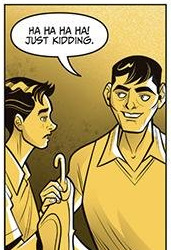
Oh dear... I'll put the full graphic novel pages down below but I have so much to say on how awful this is it'll need several posts. However, right now I want to mostly talk about representation and briefly touch on why it's so damn important + inform others about the current shit Mike and Meatly are saying about the books n such.
Now note: All the things I'm saying below are based on my personal experience, maybe some people don't care about seeing the representation of their identities in the media they consume. Maybe some will think I'm merely being dramatic and I might be but I'm not lying when I say I personally believe being represented and seen in the media you consume can be one of the most wonderful feelings in the world.
Look I'm not here to argue with people who think that Norman in particular was never meant to be a person of color, I would argue he is very coded but the points I'm making here are not about how Norman particularly had to be black. The point I want to make is the lack of diversity in our cast in general and how Norman's design has heavily dwindled it considering most people [including myself] rightfully assumed he was at least one of three black characters in our cast. Not according to this though and looking at the the rest of the pages our chances of seeing any kind of decent diverse character designs dwindle more.
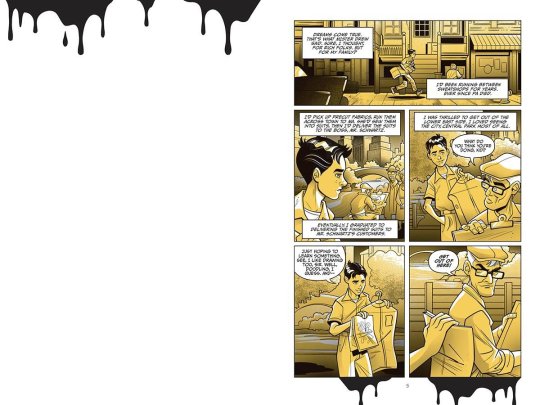
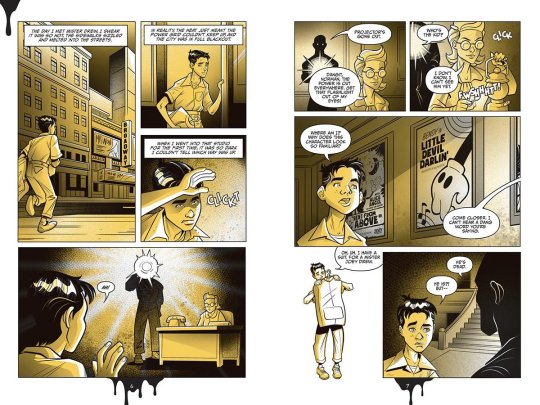
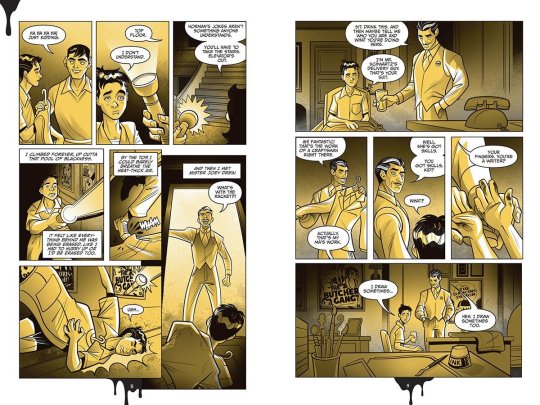
So firstly... Buddy a character who has been said to experience discrimination for being Jewish, lacks any kind of ethnic features at all. That's... Cool but yeah I think this shows a rather grim future for the character designs as a whole.
Also, Norman... As I mentioned he was largely assumed to be black due to his southern dialect, his voice, and other factors. But nope, he's a generic white guy. With... Gross looking hair tbh...
Sadly this is not the first time the topic of poor representation has come up concerning Bendy either.

[note how he disregarded the other mentioned minorities and specifically cites LGBTQ+ characters]
This sucks as a response but sadly considering Mike's recent behavior it seems to fall in line with the Bendy team's general lack of care towards representing anyone who isn't straight and white.
So how did Mike respond to all of this? Well...

TDLR - "Who cares if the Graphic Novel we're selling to our fans for full price sucks, we now no longer consider the books canon."
This is horrible, I know Mike and Meatly are only really in this for the money, the fact BATIM is in the state that it is proved that, but they really couldn't have been less obvious about it?
So basically when it benefited them, AKA when it meant people would have to buy the books to understand important lore like Boris' identity... [the character you spend all of chapter 4 trying to rescue] They were considered canon... At least the author sure thought so.
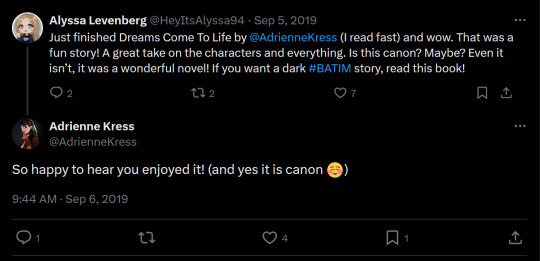
Hell even in the tweet Meatly made here he doesn't say the books aren't canon, he just says they're not needed to understand Bendy's world. Now Mike is using that as a shield instead of doing the right thing and saying "You're right, the poc in our fanbase deserve better we'll have it fixed right away!" Like most reasonable people would considering how his studio has literally been accused of bigotry, poor rep, and general lack of diversity before. Why risk making more people avoid this franchise?
Also just... Imagine how insulting it would be to be an author who helps flesh out so much of this world and gives its characters depth like NONE of the games have managed to do, filling in plot holes, creating a timeline for events, etc... Then because they couldn't bother to change the graphic novel for ur story to be better they instead throw out all ur writing and declare it non-canon.
If I were her to put it bluntly I'd feel insulted and horrible. Why make her do all the work of making sure her works align with the timeline and game's canon if they're not part of it?
I can't speak for her obviously but Meatly and Mike know of her account, so speaking out against this could very much risk her being fired or at least not allowed to work on Bendy anymore... So I would take all her tweets on this situation with a grain of salt. She very much is not in a position where she could be honest if she was against this.
So with all that history now, the question I'm sure many are wondering is... Why does this even matter? Who cares how diverse the characters are when it doesn't affect the story?
Well for one thing, if you think like that consider having more empathy for your fellow human beings but also it does affect the story. One of DCTL's themes is about the bigotry of the period it is set in.
Now the Bendy team has managed to make the discussion of this book centering around their bigotry which is ironic in a way I almost find funny... Though this entire thing is just a bit too hurtful and upsetting to find any humor in, at least for me...
But another thing is representation can bring people such joy when it's done with care. It really shouldn't be understated how far it can go to make people feel more comfortable in their own sense of self to have a franchise choose to represent them and their experiences. I know this from personal experience.
Now if you've been following me for a while, you know I'm a big fan of Transformers. I no longer engage with it much due to baggage from the fandom's awful treatment of me, but before I left I remember being able to witness the release of Transformers: Earthspark first few episodes.
These introduced the Maltos the family who meets the Transformers and serve as our protagonists and guess what?
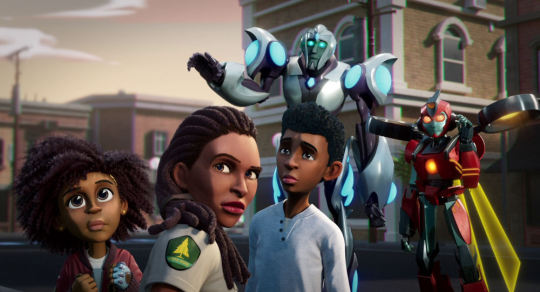
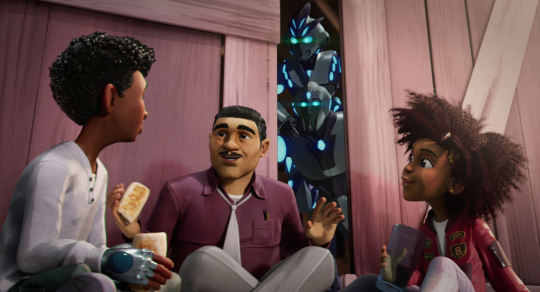
It's a family of Filipinos!
Now look I'm not Filipino, but I am half Mexican and I have a lot of love for that part of me. So seeing the representation of any Spanish culture in this franchise I loved made me so happy! I remember just watching the first episode I was happily telling my partner how fun it was to see people like me and my family in a world I love!!
But it didn't end with the Maltos in fact... There was another character who spoke to me, their name was Nightshade. Their pronouns are They/Them and they spoke about it on the show! Not just mentioning it and moving on but actually sitting down to speak about their experiences...
This clip in particular really turned them into an absolute favorite among fans and well... I'll let you see it for yourself.
This scene... Fills me with a joy I cannot describe. It is the creators of a franchise I love telling me they see people like me and find the stories of people like me important enough to include in this series. There really is nothing like being able to say there are Non-Binary characters in a franchise I have so much love for. I was far from the only one too.


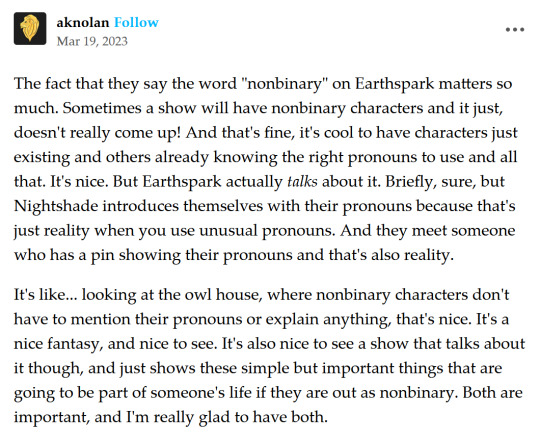
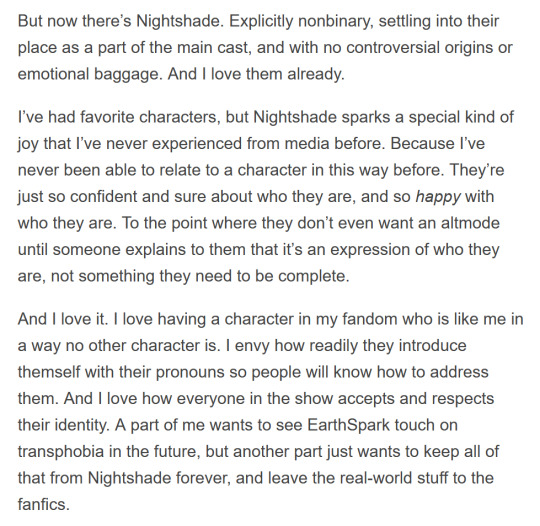
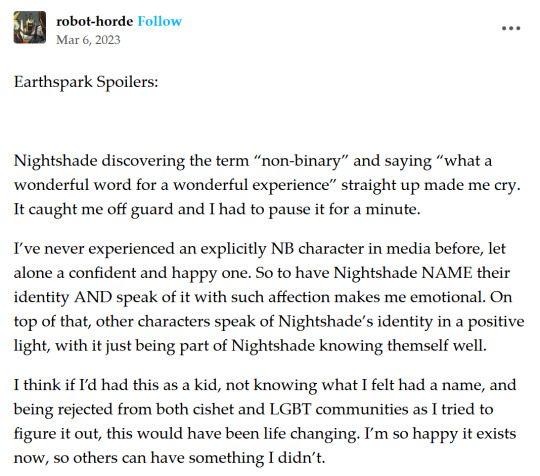
This is amazing, this is wonderful, this clip and character were moving to so so many people and...
This is a joy the Bendy creators have no interest in giving their audience. They don't care how you feel as a queer and/or black person, which... Hurts...
I... Discovered I was trans while in the Bendy community... It was where I learned the word Non-Binary and started using it for myself. To me Bendy will always have that connection... But the devs themselves seem to hate the idea of being forced to actually represent that in their games... And I still haven't really gotten over that pain or betrayal if I'm being honest.
So...
With Norman now being portrayed as white here, we are down to two black characters. Thomas [who Meatly has claimed is white in the past] based on a vague conversation with Sammy in DCTL they could easily ignore... And Jacob.... A book exclusive character which according to Mike means he is non-canon.
If we don't count Thomas' vague talk with Sammy about disrespect as confirmation he's black [which the devs don't seem to think so] then we have one black character in all of Bendy... And he recently got retconned into non-existence. Great.
Look... The Bendy fanbase has always been full of wonderfully diverse designs for the staff and even more diverse people creating them. Bendy's fandom was built with the work of queer people from all kinds of places.
If the Bendy team continues to show how little they care for anyone who isn't straight or white... I wonder who they are counting on to buy this book or in general financially support their franchise?
I know right now, I am furious, I am hurt and I most certainly don't feel like buying a book that's currently just a massive fuck you to the fans and I hope I've expressed why I feel this way in an easy-to-understand way here...
Either way, I will not be forgetting this anytime soon and I hope the fanbase does the same. Maybe just maybe, if there's enough backlash to this series of horrible decisions they'll learn better.
Right now, it's kinda of our only hope for a better future, and if you know any poc who are into Bendy right now... Maybe consider making sure they're feeling okay.
I know from experience how much this sort of thing hurts, to have the creators of a world you love straight up tell you they don't intend to fix the fact no one in their stories represents your identity or life...
What I'm trying to say is...
This is a really low point for Bendy and its fans... Even more for the poc who have to witness such ignorant and careless attitudes from Mike and Meatly towards their feelings.
Please don't forget them when you discuss these tweets or this situation. That's exactly what Mike and Meatly want right now.
For them to be unrepresented and therefore... Unheard.
#batim#batdr#bendy and the ink machine#bendy and the dark revival#seriously though we cannot let this slide#ramblez#please please keep talking about this and why its not okay#Ive already had people saying to not be too mean or disrespectful to mike over this and to put bluntly#if mike is gonna be this blatently disrespectful to his fans he deserves whatever he fucking gets#this is such a horrible situation Im just glad I got the chance to speak positively in this essay#I mean not about bendy but I got to gush about how cool it is that transformers has a nonbinary character in it so that was fun#this is what Bendy could have and refuses to... Oh well more motive to make Showtime ig#but seriously what is the point of supporting these indie devs if theyre gonna be just as horrible abt this shit#as their corporate competitors#at several points bendy just feels like every other horror game out there but worse#its so so so frustrating
105 notes
·
View notes
Note
hiya!
‼️ Hot take/unpopular opinion and/or 🏞 Mountains or sprint stages?
for the ask game 🫶🏻
tysm for the ask! sorry this is so late haha
‼️ Hot take/unpopular opinion
hm well galacticfire already had an excellent answer surrounding doping and thelittlebirdthatkeptsomanywarm also made a really great post on the topic a few days ago,,, nothing much to add to that other than Yeah🙏
other than that uhh. not really a hot take but i’m a little bit put off by a lot of the mainstream cycling community’s attitudes towards diversity in cycling? after bini spoke about his experience being a rider from eritrea and the lack of representation that exists for african riders in the tour this year, there was uh. some weird dialogue and a really strange amount of defensive pushback that i noticed in some online communities (stuff like “the peloton is already diverse” “making a big deal over nothing”, standard accusations of special snowflake behavior etc etc). i absolutely understand that the vast majority of infrastructure for cycling as a professional sport exists and has developed within europe and that automatically makes it so difficult to expand on a similar level to other continents, not to mention all the moving pieces that concern how a country’s development, economic status, and culture influences what sports thrive in those regions, but i’d truly love to see the sport grow!! i just hate how bringing up stuff like this makes you have to walk on eggshells so no one feels like they’re being accused of racism— that’s really not the point man 😭😭 having to coddle people before even bringing up the possibility of inaccessibility and discrimination in the industry is just really frustrating. also it’s such a multifaceted conversation that is rooted much deeper than just the professional level��� we need to be addressing inequality and introducing diversity in youth spaces and that requires a culture shift on many many different levels + better examining all the socioeconomic factors impacting sports pipelines etc etc
yeah there’s obviously more to say but idk if that was coherent and there’s probably more intelligent opinions out there 🙂↕️🙂↕️
🏞 Mountains or sprint stages?
ough hmmmm i’d say mountains for the drama 😬😬 there’s usually more of a storyline and i’m also in it for the cool photos 🤷♀️
10 notes
·
View notes
Note
Ok your tags on the reblog were very cool, would love to hear more about this project. Also, this is entire based on vibes of just existing in or near PA and having incredibly revisionist (and religious) history books, yeah. Sounds right.
Yeppppp! Get ready for a long answer cause i am in the thick of it! I'm pretty much a complete outsider to this topic. USA history doesn't interest me as much as ancient history does. The whole theme of the project is religious in/tolerance, and I picked Pennsylvania because my in-laws are all in Pittsburgh and I thought getting to know the state more would be fun! I've already got a pretty good background in religious history, so most of my research has been contextual colonial history. But the primary source I'm basing my project on is AWESOME. It's "Gottlieb Mittelberger's Journey to Pennsylvania" (free in the Library of Congress btw) and it's just so full of amazing information about colonial PA and how it was viewed by outsiders at the time (for Gottlieb, it was pretty godless and not worth the hype despite how beautiful the country is. He lived in Lancester county for about 4 years before returning to Germany).
The basis of my research is that in Europe, most Protestant sectarians (Quakers in particular) were seen as anti-state/anti-authoritarian. Being a dissenter was the same as being a treasonous terrorist because religion was the basis for most if not all laws and public policy within a country. So dissenters like William Penn were heavily discriminated against based on their beliefs and punished by the state as tho they were public enemies number one (spiritual danger = real danger). So quite frankly, because the America's were the place for criminals to be sent anyway, it kinda made sense to let dissenters leave and rotten themselves and their communities else where. So William Penn gets permission from his buddy King James 2 to create Pennsylvania as a "holy experiment" for liberty of conscience (and Quakers) to go. Penn advertises in England and Germany for the most part about this land of religious freedom and opportunity. With a little censure from the crown about how he sets up the colony, Penn makes it law that people can believe what they want and therefore worship and do what they want (within reason). From the outset of the colony, we have a very diverse environment full of very diverse people. No single people's settled PA, despite Quakers being a majority for a time and even when they weren't the majority they still held most of the power in the colony.
Anyway, all the secondary literature I've read all say the same thing: Penn's holy experiment was a success. Religious tolerance helped make PA economically and politically successful and set up all the American colonies for an equally successful revolution. But I've noticed that they're all ignoring, or just plain forget because 'MURICA, that the colonies were not completely separate entities from their parent country and are enabling the narrative of usa supremacy and individualism that DID NOT EXIST at the time. Individualism sure as hell did exist, but not in the sense of "im an american." It was "I'm an English Quaker" or "I'm a German Lutheran" or other ethnic or religious identification. These historians make it sound like everyone thinks PA was a great thing... but here we have over 100 pages of a German immigrant's travelog that heavily criticizes Penn's colony, telling his fellow Germans that it's just not worth the risk and they're better off at home. Obviously there's a ton more nuance to the account than I'm giving here, but the whole book is him saying "here's this bad thing, here's this good thing but here's the dark side of the good thing that isn't immediately obvious but I will explain it to you for your own good, and here's another bad thing." Most of the negativity he gives about PA in particular is religiously based: anarchy and atheism (exaggerations, but it was how he saw it as a faithful Lutheran). He tells stories of women running the show (heaven forbid!) And how the courts and laws are so lax that everybody does what they want even if theyre sued! These are seen as bad things to him, but obviously to a modern person (and to many a modern Pennsylvanian) it sounds like libertarian paradise. The idea of "success" is what I'm challenging with the Gottlieb account; we as historians are always needed to challenge the narrative. Complicate the story. The 13 colonies as a melting pot and overall success story is a good story and we use it to reinforce murican values in our public schools (something i greatly disagree with but it is what it is). But it's not the whole story and never will be. We've got the puritans in New England doing their thing and the Quakers in PA doing theirs, but what did that actually mean to people at the time? Did they see it as success? I should probably stop now haha! This is getting long. Thanks for asking about my project, it helps me articulate it for my prospectus due in a few days. ❤️❤️❤️❤️
4 notes
·
View notes
Text
[ ID: Four screenshots containing a letter from Daniel Radcliffe that reads as follows: By Daniel Radcliffe. I realize that certain press outlets will probably want to paint this as in-fighting between J.K. Rowling and myself, but that is really not what this is about, nor is it what's important right now. While Jo is unquestioningly responsible for the course my life has taken, as someone who has been honored to work with and continues to contribute to The Trevor Project for the last decade, and just as a human being, I feel compelled to say something at this moment. / Transgender women are women. Any statement to the contrary erases the identity and dignity of transgender people and goes against all advice given by professional healthcare associations who have far more expertise on the subjct matter than either Jo or I. According to the Trevor Project, 78% of transgender and nonbinary youth reported being the subject of discrimination due to their gender identity. It's clear that we need to do more to support transgender and nonbinary people. not invalidate their identities, and not cause further harm. / I am still learning how to be a better ally, so if you want to join me in learning more about transgender and nonbinary identities check out The Trevor Project's Guide to Being an Ally to Transgender and Nonbinary Youth. It'san introductory educational resource that covers a wide range of topics, including the differences between sex and gender, and shares best practices on how to support transgender and nonbinary people. / To all the people who feel that their experience of the books has been tarnished or diminished, I am deeply sorry for the pain these comments have caused you. I really hope that you don't entirely lose what was valuable in these stories to you. If these books taught you that love is the strongest force in the universe, capable of overcoming anything; if they taught you that strength is found in diversity, and that dogmatic ideas of pureness lead to oppression of vulnerable groups; if you believe that a particular character is trans, nonbinary, or gender fluid, or that they are gay or bisexual; if you found anything in these stories that resonated with you and helped you at any time in your life - then that is between you and the book that you read, and it is sacred. And in my opinion, nobody can touch that. It means to you what it means to you, and I hope that these comments will not taint that too much. Love always, Dan / There is one final image of a head shot of Daniel smiling at the camera, with one arm folded over the other. /end ID. ]
Also a good time to remind folks that Dan is Jewish. While he may be an ally to the queer community rather than a member of it, his perspective on the ongoing bigotry and vitriol spewing from JKR is assuredly coming from an equally personal place and I have no doubt that he has likely also feel deep, personal pain over the direction that her views and the entire franchise has taken.
The Jewish community here on tumblr was the first to warn us about the underlying rot about a decade ago and the first to believe the trans community when we started saying "hey wtf is going on with JKR's twitter lately; she's getting really transphobic."
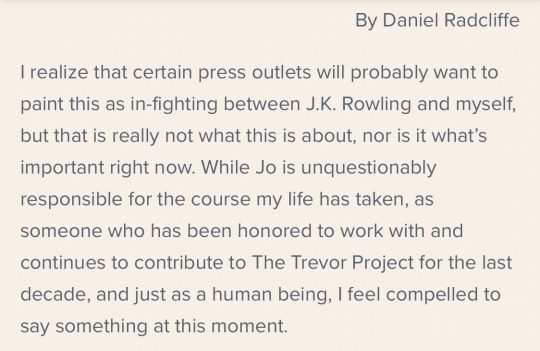
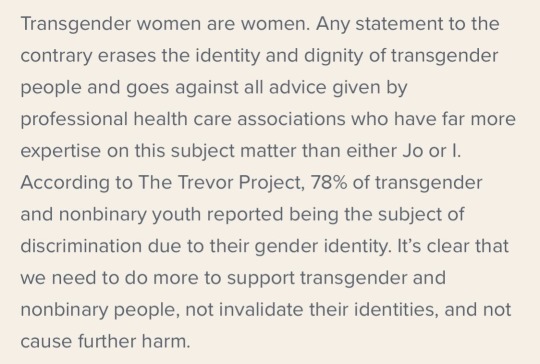
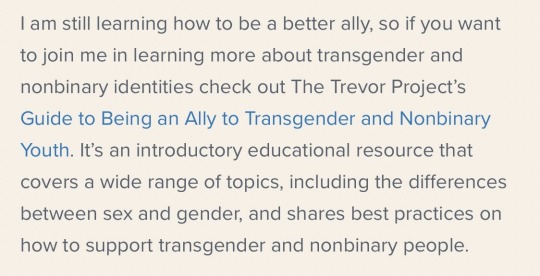
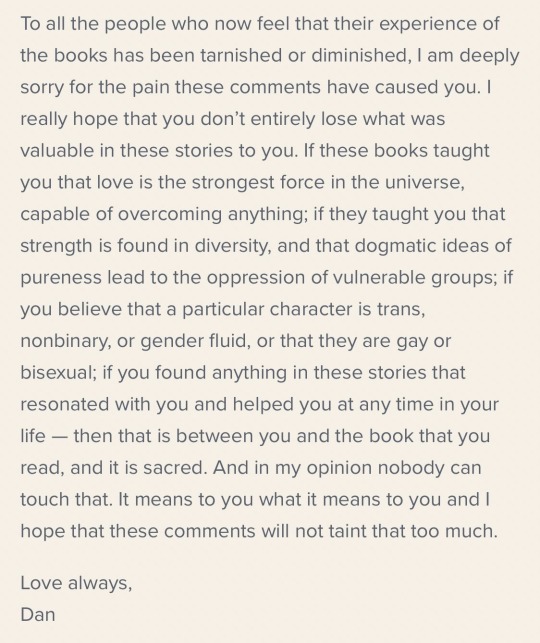

daniel radcliffe calling out j.k. rowling on her bullshit is big dick energy
148K notes
·
View notes
Text
Wandering Son

Wandering Son tackles an issue with society that continues to affect people to this day. That is transgenderism or trans identity. In the show, the main character struggles with their identity as they go from one gender to the other. At school, he is usually known as a boy, but for some time, he is also experimenting with girls’ clothing. Trying it on and exploring the city with it. One of the central problems that the show comes to is that of their classmates accepting them for who they want to be, which is a girl when they ultimately come to school dressed as one. They are then made fun of for this and called a freak for trying this stunt, making him in the end revert to just always being a boy and never going out of his way again to dress as a girl. This show how vehement society can be towards something they find altogether different or pervasive. They reject what they cannot understand and find the means to make fun of the people who dip their feet into it as a means of maybe “fitting in”. What society cannot comprehend as right is then rejected without much thought to the matter because it is deemed different. It is no different from the other anime that we watched that covered the topic of discrimination where people who want to try being themselves are then shunned for trying. The sad reality is that they would then slink back to the “right” version of being themselves, showing how society changes us to become the same tight-knit individuals without any diversity. The very idea of seeing this as dangerous is a danger in itself, and a problem that at times many are not willing to address. So as society continually moves forward, the willingness to address this issue of hate needs to be better tackled.
0 notes
Text
Daniel Radcliffe has been a vocal supporter of the lgbtq+ community for over a decade, and back in 2020 denounced JKR for her transphobia


[Image ID: Two screenshots from the Trevor Project website of Daniel Radcliffe's tweets on 6/8/2020 regarding gender identity with a picture of his head shot in the top left corner of the first screenshot. The text reads as follows;
"I realize that certain press outlets will probably want to paint this as in-fighting between J.K. Rowling and myself, but that is really not what this is about, nor is it what's important right now. While Jo is unquestionably responsible for the course my life has taken, as someone who has been honored to work with and continues to contribute to The Trevor Project for the last decade, and just as a human being, I feel compelled to say something at this moment.
Transgender women are women. Any statement to the contrary erases the identity and dignity of transgender people and goes against all advice given by professional health care associations who have far more expertise on this subject matter than either Jo or I. According to The Trevor Project, 78% of transgender and nonbinary youth reported being the subject of discrimination due to their gender identity. It’s clear that we need to do more to support transgender and nonbinary people, not invalidate their identities, and not cause further harm.
I am still learning how to be a better ally, so if you want to join me in learning more about transgender and nonbinary identities check out The Trevor Project’s Guide to Being an Ally to Transgender and Nonbinary Youth. It’s an introductory educational resource that covers a wide range of topics, including the differences between sex and gender, and shares best practices on how to support transgender and nonbinary people.
To all the people who now feel that their experience of the books has been tarnished or diminished, I am deeply sorry for the pain these comments have caused you. I really hope that you don’t entirely lose what was valuable in these stories to you. If these books taught you that love is the strongest force in the universe, capable of overcoming anything; if they taught you that strength is found in diversity, and that dogmatic ideas of pureness lead to the oppression of vulnerable groups; if you believe that a particular character is trans, nonbinary, or gender fluid, or that they are gay or bisexual; if you found anything in these stories that resonated with you and helped you at any time in your life — then that is between you and the book that you read, and it is sacred. And in my opinion nobody can touch that. It means to you what it means to you and I hope that these comments will not taint that too much.
Love always, Dan". End ID]
Good Trans News!!
Whenever a celebrity turns out to be transphobic they get a million hours of media coverage and spotlight. It’s easy to feel like every famous person hates trans people, and that’s just not true! We have tons of high profile allies!
Here is a quick list of some (but definitely not all) supportive celebrities! Please feel free to add to this list.
21K notes
·
View notes
Text
I’ve been struggling to find a way to properly word this for my mental health blog but i just feel like it’s too complex a topic to attempt to cover so I’ll just ramble about it here on my semi private blog
here are some of my thoughts on the attitudes I’ve witnessed online in regards to schizophrenia and its relation to bigotry
I’m noticing a trend online (twitter and tiktok specifically) of people uncritically and carelessly conflating schizophrenia with bigotry and far right conspiracy theories. Calling their qanon relatives schizophrenic. Calling antisemitic talking points schizoposting. Just today i saw someone call jkr schizophrenic because of an odd tweet she made, wondering if her transphobia developed into to schizophrenia (like what????)
now, there’s a LOT of discussion to be had about how psychosis and paranoia can affect critical thinking, how delusions can be religious or politically influenced, how intrusive thoughts can make us think things we don’t normally believe, how schizophrenia can cause someone to think or act in unpredictable ways, how psychosis can manifest in groups, etc. Schizophrenia is a thought disorder, after all.
But i think people (specifically non schizophrenics) are doing schizophrenics a major disservice by implying that bigoted ideas are caused by schizophrenia or vice versa. I’m not saying that there are no bigoted schizophrenic people, or that a schizophrenic person can never be racist/sexist/etc. But you guys have got to stop treating the two things like they’re inherently correlated, and you especially need to stop thinking you can diagnose strangers on the internet with a serious mental illness like schizophrenia because they post racist tweets online.
Like come on, do you guys know how that makes the rest of us feel? Do you think throwing us under the bus helps us in any way? Do you think it helps someone like me, a queer schizophrenic person of color, feel any better about myself that you think my illness is known as the racist antisemitic illness? Do you think it won’t add to the stigma, the ostracism, the discrimination? Do you think that your careless, flippant attitude towards an already very stigmatized illness will have no consequences for us?
Over the years we’ve made some slow and steady progress in fighting the schizophrenic stereotype of “crazy psychotic violent killer,” but now we have a new stereotype to battle, the “batshit racist qanon schizoposter” that self proclaimed leftists and mental health advocates who you think would know better are perpetuating uncritically.
World Schizophrenia Day is coming up later this month and i felt the need to say something about this trend I’ve noticed. Non schizophrenics, I really encourage you stop buying into this idea that schizophrenia is the evil racist brain disorder. It’s so much more complicated than that, and schizophrenia affects an incredibly diverse group of people from different backgrounds. The schizospec community is full of wonderful, creative, and loving people. Stop trying to see the worst in us, stop speaking for us, and give us a chance to share our own voices and experiences.
#idc if this is poorly worded these are just my thoughts i wrote as they emerged in my brain#the subject for today
1 note
·
View note
Text
Editor's note: Note: Language is constantly evolving. Reflecting the fluidity of labels used within the Latino community, the following terms are used across the article, often interchangeably: Hispanic, Latino, and Latinx. By no means is this list exhaustive, and in future pieces we anticipate using additional terms, including Latine.
In the lead-up to the 2024 presidential election, Latino voting behavior will be widely discussed, as Latino voting patterns are remarkably nuanced and vary by region, age, gender, and national origin, among other factors. Candidates, campaign consultants, journalists, and policymakers should expect economic issues to be a top concern for Latinos, as in previous election cycles. In light of this, it is worth examining Latinos’ current economic condition in the United States.
According to the 2019 Survey of Consumer Finances (SCF), significant wealth disparities exist between families of different races and ethnicities, including between white households and Hispanic/Latino households. White families have a median wealth of $188,200, whereas Hispanic families have a median wealth of $36,100. Another way to look at the SCF data is that the average white family has five times the wealth of the average Hispanic family.
This data raises important questions. What is the context behind the numbers? How did we arrive at such disparities? And is there even such a thing as “the average Hispanic family?”
Though Latinos have been one of the fastest-growing demographic groups in the United States for decades, the underlying causes of the wealth gap between Latino and white families are often misunderstood, resulting in the prioritization of smaller-scale programmatic solutions over larger-scale policy ones. Public narratives about Latinos’ economic condition place far too much emphasis on individual behaviors of the group, rather than structural factors such as discrimination, racism, and segregation. For example, efforts to address disparities in wealth tend to concentrate solely on fixing Latino behaviors and decisionmaking by providing financial literacy resources, as opposed to pairing these with policy solutions to address systemic barriers that prevent Latinos from building wealth in the first place.
Critically, Latinos are extremely diverse, and policy work must address the wide range of starting points and lived experiences they possess and how these differentiators correlate with wealth-building. Among these are Latinos’ racial diversity, immigration status, socioeconomic status upon entry into the U.S., generational distinctions, and even regional differences.
Brookings Metro is exploring and addressing these questions creatively and rigorously by deploying the Brookings platform and regional insights to conduct cutting-edge research on Latino wealth; develop policy frameworks and tools for federal, state, and local policymakers; and host convenings on the topic.
As part of this project, this report serves as the first in a series at Brookings Metro examining Latino wealth. This report outlines some basic building blocks and approaches to better understanding the state of Latino wealth, Latino assets and debt, and the context behind the numbers. From there, stratification economics is introduced as a framework for understanding wealth disparities—moving the focus away from individual behaviors and instead toward the structures and processes that create and maintain social and economic disparities.
0 notes
Note
🔥 the sequels? Anything about them tbh, I just wanna hear your hot takes about them 😂
oh boy do I have Thoughts™. some of these are unpopular, some are popular, but I'm not here to discriminate
the entire thing should've had at least a rough plan before they even started to make tfa. the problems that the cursed movie and tros had were mainly caused by the fact that no one planned anything for shit beyond tfa
the problems the shitshow trilogy had reflect directly to the problems everything made after it has
ruin johnson is a hack writer and hack director who doesn't understand star wars for shit
I will never understand why they felt the needs to separate the original squad like that
if you're gonna write a sequel, don't just recycle what came before. I still love tfa but can agree it was too much of an anh rehash
speaking of recycling, don't recycle every single mistake made in the earlier installments jesus fuck
if they wanted rey to be a nobody then don't give her all those luke parallels!
lando was criminally underused
rose tico deserves better now and forever
kyle ron did not deserve any kind of redemption, especially not by hallucinating his father who he killed after his mother dies for him
speaking of, han and leia deserved a better child and I wish kaydel ko connix had been their canonical daughter
poe had a canonical backstory in the comics that could've easily been referenced with a line or two, why the fuck did they feel the need to retcon it???? and make it worse?????
finn's storyline in the cursed movie is just his storyline in tfa with some extra steps
rey's storyline in the cursed movie is just her storyline in tfa with some extra steps
finn should've lead a stormtrooper uprising
LET SKEEVY SHEEVY STAY DEAD AND KYLE BE THE MAIN VILLAIN JESUS FUCK
I love parallels and callbacks but they have to mean something. don't just slap them in and call it a day
if you're gonna boast about having a diverse™ cast then don't make the white male villain your main character and actually treat your characters of color well
lucasfilm didn't do shit to protect john boyega and kelly marie tran from bigoted harassment and I will forever hate them for it (I know daisy ridley and oscar isaac also got some but john and kelly were especially targeted throughout the run)
all the characters, even the villains who I hate, deserve a better story
send me a 🔥 for unpopular opinions (please give me a topic)
#replies#shrinkthisviolet#sw asks#unpopular opinions#kind of#idk how unpopular these are#anti sequel trilogy
16 notes
·
View notes
Note
Hii random long question but... I'm starting to write a short piece on how the world treats "ugly" people. Ugly as in not fitting society standards of beauty, wether that may be being ugly, fat, hairy, unkempt, etc... I wanted to ask: is there anything that from your experience is "missing" when talking about these topics? Or any piece of advice you'd give people dealing with the hate the world gives them so they can heal or not sabotage themselves?
(btw when you read that message... pls don't think i'm calling you ugly, someone else pointed it out to me that that's what it sounded like and it's sooooo far from the truth. i just think you are kind and am interested in your insights akdsjafhd)
I'm only a random person, and not any kind of scholar when it comes to the subject. I don't even have much personal experience with this really. but I've learned a lot about this subject second-hand, so I can offer a few personal opinions off the top of my head. just know I'm not the end-all source for this stuff
1. make it clear that "ugly" and "pretty" (and all similar descriptors) originate from eurocentric beauty standards, christian morality, ableism, lgbt-phobia, classism and etc. these are not innate facts about humanity, but learned and enforced biases. this is especially important within the context of people "reclaiming" ugliness, or making points that "it's ok to be ugly". on an individual level, I don't think this is necessarily harmful, but it's a very tight rope to walk because the moment you insinuate any one feature is inherently "ugly", you've already lost. there are no ugly features, only features which fail to live up to white/christian/ablebodied/cishet/upper class/ etc expectations. this subject, and the oppression of minorities, absolutely overlap, and it's dishonest to not include that at the center of this discussion.
2. in general, I think a lot of the body positivity movement is too sanitized in a lot of the ways, and doesn't really touch on the more stigmatized ways someone could be considered "ugly" by society. "diverse" underwear models are still models. they're still beautified by professional stylists and airbrushed in photoshop. it's better than nothing for sure, but they don't look like real people who ride the bus. what about people with facial differences? people who are unkempt/unwashed? people who are fat and gnc in casual clothes? or all of these traits at once? I don't see a lot of (mainstream) celebration of these traits, or of similarly marginalized experiences, but I see plenty of vitriol against them on the daily.
3. a lot of discussion about "ugliness" or about body positivity, talks about self love and self care. but self esteem issues are the symptom, not the disease. the truth is if you are deemed "ugly" by society, you face material discrimination. (again, note how this overlaps with racism, classism, ableism, etc). you can be denied anything from employment to simple kindness. the topic of "ugliness"/"prettiness" is not a superficial one, but very serious and often life defining.
as for "advice", I really can't think of anything meaningful other than find a community you feel safe in. something great about the internet is you have access to so many micro-movements and subcultures, and regardless of what you're dealing with there are going to be other people out there who are willing to love and accept you and who may even share the same struggles.
idk, I hope this is what you were looking for/that this helps in some way. but this is a complicated topic, and I'd def recommend finding some scholarly articles or books on it if you can too, for more sound sources
#Anonymous#while writing this I was 100% piggy backing off things I've been told by those more affected by this kind of stuff -#- but if I phrased anything badly lmk#I have my own quirks that I've talked about before but ultimately no one really described me as ugly so I know I'm privileged here
7 notes
·
View notes
Text
DANIEL RADCLIFFE RESPONDS TO J.K. ROWLING’S TWEETS ON GENDER IDENTITY
I realize that certain press outlets will probably want to paint this as in-fighting between J.K. Rowling and myself, but that is really not what this is about, nor is it what’s important right now. While Jo is unquestionably responsible for the course my life has taken, as someone who has been honored to work with and continues to contribute to The Trevor Project for the last decade, and just as a human being, I feel compelled to say something at this moment.
Transgender women are women. Any statement to the contrary erases the identity and dignity of transgender people and goes against all advice given by professional health care associations who have far more expertise on this subject matter than either Jo or I. According to The Trevor Project, 78% of transgender and nonbinary youth reported being the subject of discrimination due to their gender identity. It’s clear that we need to do more to support transgender and nonbinary people, not invalidate their identities, and not cause further harm.
I am still learning how to be a better ally, so if you want to join me in learning more about transgender and nonbinary identities check out The Trevor Project’s Guide to Being an Ally to Transgender and Nonbinary Youth. It’s an introductory educational resource that covers a wide range of topics, including the differences between sex and gender, and shares best practices on how to support transgender and nonbinary people.
To all the people who now feel that their experience of the books has been tarnished or diminished, I am deeply sorry for the pain these comments have caused you. I really hope that you don’t entirely lose what was valuable in these stories to you. If these books taught you that love is the strongest force in the universe, capable of overcoming anything; if they taught you that strength is found in diversity, and that dogmatic ideas of pureness lead to the oppression of vulnerable groups; if you believe that a particular character is trans, nonbinary, or gender fluid, or that they are gay or bisexual; if you found anything in these stories that resonated with you and helped you at any time in your life — then that is between you and the book that you read, and it is sacred. And in my opinion nobody can touch that. It means to you what it means to you and I hope that these comments will not taint that too much.
Love always, Dan
7K notes
·
View notes
Text
Actually let me pull out my bachelors degree for a moment and explain why sci-fi films benefit and hold back POC!
When the sci-fi genre was brought to television (Star Trek) it was a groundbreaking moment for diversity in television! Not only did it give the show runners opportunity to cast black actors and POC because the show took place in a parallel world where discrimination was not a problem, it opened the door to tell stories that made controversial topics easy to digest.
Because in the sci-fi genre, you need multiple races/cultures/species to tell a good story. In space nobody looks the same. Fascism, racism, bigotry, sexism. All those topics that were taboo on TV could be retold in a different format. They didn’t have to say “black” to tell a story about racism. They could make an alien race that was being treated unfairly to show white audiences how cruel racism can be. People were shocked that the show was bold enough to go there. There was lots of criticism but praise too because using fictional scenarios is an easier way for people to cope with challenging topics.
So this quickly became a common trope in sci-fi. Alien race not treated fairly starts a revolution. They’re branded as “violent” or “barbaric” until our heroes get to know them and learn they’re not different and simply demand respect. A character learns they’re half of this race and feel shame/worry they’d be treated differently but their friends reassure them they don’t discriminate and love their friend all the same.
This is where I argue this trope is not really relevant in modern film. Film has advanced so much in storytelling where we no longer need this trope to talk about these topics. To be blunt, it no longer represents our modern world. It has been overused so many times, it has lost its meaning. Show writers have forgotten its purpose and we get watered down versions of the initial template.
So as you can see, Loki’s story is not new. It’s not challenging or groundbreaking for its time. It’s a trope. A trope that can still bring up conversation. But to say Loki being a frost giant represents POC is not accurate. There are better ways to represent BIPOC in film and using an alien race is outdated and overdone.
#just my opinion#mother are you proud my degree was put to use?#elle's thoughts#film tropes#film analysis
9 notes
·
View notes
Text
Blog Post #1 -- Meg Lastoria
*DISCLAIMER: THIS BLOG WAS CREATED FOR OUTD 2511, LAKEHEAD UNIVERSITY. THE OPTIONS EXPRESSED HERE ARE MY OWN IDEAS AND NOT THOSE OF LAKEHEAD UNIVERSITY. LAKEHEAD UNIVERSITY IS NOT RESPONSIBLE FOR THE ACCURACY OF ANY INFORMATION SUPPLIED BY THIS BLOG.*
Prompt: “Firstly, what has drawn you to this academic program? Secondly, as a consumer of knowledge, who do you rely upon for information? Consider perhaps three or more “sources”. How do you ensure this information is reliable? How does this relate to this program?” Prompt Provided by Dr. Amanda Hooykaas.
Answer:
When I was younger, the idea of anything to do with Outdoor Recreation, Parks & Tourism had never crossed my mind, but I knew that I loved being outside. I believe that throughout my life, the journey I’ve been on -- whether it’s through summer camp or maybe even just hiking with my Aunt and her dogs -- has led me to this program. Honestly, before this I thought I wanted to be a novelist, but the second I read what Outdoor Rec, specifically this program, was about, my first thought was “that’s me!”. So everything I did from then on was to get into this program and any other school I got into didn’t matter anymore, Lakehead was the number one prospect. I think I’ve always craved being a part of this world, especially in the deeper sense that this program has to offer. Therefore, to me the only answer that I can provide as to “why?” is that I’m in love with recreation and everything the outdoors has to offer, except for cross-country skiing, I hate it!
As a consumer of knowledge in today’s society, I rely on social media, media (ie. the news), and the internet for my information. How I make sure this information is reliable is that I go to the most recent news possible, as well as the most recent experiments conducted by doctors (MD or PhD) to ensure that I can trust it because it’s from a person who has done extensive research into the topic. If it’s from social media, I generally only believe it if it's a person of colour, another woman, a member of the LGBTQ2+ community talking about their experiences as a minority, or an expert in their field. The news will only provide you so little because, especially in the US, the news is typically run by white cis-gender people so it’s not the most diverse perspective given. As humans I feel it is our duty to diversify our knowledge and it directly relates back to this program because Outdoor Recreation doesn’t have the best track record when it comes to inclusivity. Now we have the JEDI principles, which are Justice, Equity, Diversity, and Inclusion. These principles were put into place to rectify the amount of injustice there is in Outdoor Recreation. I say “is” because as much as these principles are put into place, I as a woman will still face discrimination from a man who is believed to be “better” than me. I’m speaking from experience because there was a point where I was on a trip and this other group member who was male wouldn’t take my advice on his canoeing skills even though I’ve been canoeing my whole life and this was his first time. So to relate this back to what I’m saying about sources of information is that you should listen to those who have more experience with something than you do, regardless of gender, race, or sexuality, that’s how you know it’s reliable because it’s someone with years of experience and knowledge. Someone who has taken it upon themselves to change their perspectives and grow from those perspectives. So I, as a consumer of knowledge, am constantly looking for ways that I can be a better guide in the Outdoor Recreation world, especially since I am a white woman.
15 notes
·
View notes
Note
Do you think that making Chinese food is cultural appropriation? I'm white and started making some of the foods I saw in the shows I've watched since the untamed, but now I'm worried I'm appropriating the culture.
Hi anon,
As a fellow white person, I am also someone who needs to critically reflect on how I engage with different cultures. I can't give you the definitive answer you seek, the clear absolution from any potential wrongdoings; in its stead, I can only offer to share my current thought process on this topic. I’d still encourage you to seek other perspectives, and many people have written or spoken on this topic.
I believe we must first acknowledge that, on the terrain of the internet, discussions regarding cultural appropriation have reached a certain... extreme where some people view all forms of cultural exchanges as inherently suspect. They purport that so long as you stay within the bounds of ‘your’ culture, you will problematic behaviours. That perspective is inherent flawed. That is, it relies on a vision of culture as ‘bounded entities’ that exist in themselves. In reality, the ‘stuff’ that makes culture is emergent, existing only relationally, dialectically--it is a not a ‘thing’ that moves through time but an idea which is constantly negotiated and reproduced in relation to power and changing material realities to remain relevant and intelligible. The boundaries of cultural and ethnic groups are fuzzy, overlapping, and constantly being reworked and made meaningful. As an illustration, many of the food I grew up eating was influenced by ingredients and recipes immigrants brought in the 19th and 20th centuries, yet these dishes were understood as 'typically ours’. And it needs to be acknowledged that most of what is currently considered ‘white people food’ relies on ingredients that were introduced to our diet through colonialism and the violent dispossession of indigenous peoples (and, often, the current day exploitation of workers in the South and of migrant workers). No food can be truly ‘traditionally ours’, whatever the purported ‘we’ ends up being brought into the equation, and no eating behaviours can avoid the historical legacy and continuity of violence and power.
Of course, as people who exist in the world, we know that there are cultural differences. Bakhtin’s insights on language through the tensions between centripedal (ie towards uniformity, a common meaning) and centrifugal (toward diversity and change) forces can be expanded to help us conceptualise how we make sense of the way a ‘culture’ is perpetuated through time as something meaningful in our daily lives. Uniformity allows intelligibility, sense-making, but diversity and change are inescapable by-products of individuals and groups repeatedly going through life, meeting and trying to create intelligibility and sense together in a world that cannot stay the same. It is at the intersection of these two conflicting forces that something can be different yet considered the same--that we can create continuity out of change. But something perhaps less emphasized in Bakhtin’s discussions is how much power and material realities work on these forces. Power influences both centripedal and centrifugal forces, if only in orchestrating circumstances that shape how one encounters ‘different cultures’ or reproduces their 'own' culture.
We live at a moment where the world seems to have reached an apex of connectivity--where goods, people, ideas (and viruses) move across distance and borders at speeds that defy comprehension. Yet the way goods, people and ideas move (through which canals and systems? in which direction? to the benefits of whom? at the expense of whom? to what reception or use? in the service of which institutions and ideologies?) or are, inversely, incapable or unwilling to move, is influenced by power and material realities. It is inescapable.
In a roundabout way, what I’m trying to say is that it's useless to try to live life in 'your lane' by turning to a baseline 'culture' because we simply do not have a baseline culture to return to that is 'safe' from the influences of other cultures or the taint of the historical legacy and continuity of violence. So how do I personally reconcile that with how I engage with content that is produced from different cultural contexts, and how I engage with cooking food that is influenced by different cultural contexts? For me the guidelines I take into consideration are respect, attribution and avoiding forms of dehumanisation. These emerged out of witnessing how other white people have acted as well as critically reflecting on how I have acted in the past, and trying to do better (including of course, by listening to different perspectives on the topic). [just in case, warning for examples of racism/micro-agressions] I've been in China with white people who would praise the cooking we were eating in the same breath they were making jokes about dog meat. I've witnessed in Japan a dude decide not to come to an izakaya with Japanese colleagues, fucking off on his own to Akihabara instead, because he was disappointed he couldn’t talk about anime with them--too obsessed with the idealised version of Japan he’d created in his head to treat the Japanese people he met as people. The internet is full of white people telling you how to cook food from places they've never been and taking credit for 'popularising' that dish or 'making it better'. That's not even talking about the tendency for food to become a mark of a cosmopolitan, metropolitan identity in the West--the open-minded, the liberal, the traveler, the hip white person up with the times and beyond the mainstream. Hell, I've even seen people who act as if eating ‘ethnic’ food prepared by immigrants is the singular proof that they were people who cared about immigrants' well-being.
Food is rarely just about food, even when consumed at home. At the same time, we’d be remiss in all these discussions of power to dismiss how food is also one of oldest things we, as humans, want to share with others--including strangers. Feeding is nourishing and giving, eating is accepting into ourselves something made by others. Most people appreciate it when the value of a dish that holds importance for them is recognised by others--although, of course, many might understandably also resent that they have been discriminated against or mocked for eating that same food. Every time I’ve been invited in an immigrant household or at events with mostly immigrants, I’ve felt this sense of almost trepidation emanating from them, waiting for my reaction, and satisfaction once I was seen eating and appreciating the food they had served me--as if the acceptance of the food that was tied to their identity was a form of acceptance of who they were. Of course this can’t be disentangled from past experiences where other people might have been disrespectful, dismissive or outright racist: but the excitement they had in sharing food that had meaning to them and seeing others appreciate it was genuine.
Beyond situations of clear cultural sharing, where we get closer to what appears to be ‘cultural appropriation’, I believe that we cannot act as if there is something inherently sacrilegious in the idea of adapting recipes or using a specific ingredients in new ways--that’s centrifugal forces at play, and they have provided us with many dishes we love today: from immigrant creations like butter chicken to things like spicy kimchi. We cannot work with the assumption that people will only react with hostility at the idea of other people cooking the food they grew with, even in ways that are different from how they’re traditionally used and are thus “not authentic”. I still remember an interaction I had in a Korean grocery store, once upon a time when I lived in a metropolitan city. A man in front of me at the cash register who had been buying snacks and chatting with the employee in Korean looked at my stuff and suddenly asked me if I knew the name of the leafy green I was buying. I wasn’t necessarily surprised because I had overheard in the past customers and employees commenting in Korean about being surprised about the ingredients I, a white person, was purchasing, thinking I couldn’t understand them. I confirmed to him that I knew I was buying mustard greens. He then asked me what I was planning to do with them, and I explained that while I didn’t think it’s a traditional or common way of using it, I personally liked to add them to kimchi jjigae because it compliments their bitter/strong taste and I like leafy greens in my soups and stews. He said it was interesting, and that he was kind of impressed. The employee chimed to tell me I should be honoured at the compliment because the man was actually a chef who owned famous Korean fusion restaurants in the city. That was clearly someone who took Korean food very seriously and clearly had a certain degree of suspicion regarding how white people interacted with it, but he was also curious and interested in seeing how I approached ingredients without having grown up eating them.
Another point of contention is also that we cannot ignore that food is a sensual experience and that, while tastes are greatly influenced by our environment, they are not solely so. I grew up hating most of the food my parents would serve me, and started cooking in my early teens to avoid having to eat it. Before I started cooking, I would often just eat rice with (in hindsight horrible) western-brand soy sauce instead of the meal my mom had made. When I ate Indian food for the first time during a trip at the ripe age of 16, it blew my mind that food could taste like this. Of course I never wanted to look back, and with each years I discovered that a lot of Asian cuisines fit my palate better than what I grew up eating or other cuisines I had tried. When I was a teenager we visited my mom’s friend in France and I hated what she served us so much I’d simply choose to nibble on bread, prompting her to try to stage an intervention for my ‘obvious’ anorexia. Yet, being in China made me realise ingredients I thought I hated had just been cooked in ways I disliked. Do my taste buds absolve me from any need to think critically about how I interact with food? Of course not. But sometimes the reason we want to cook certain recipes and foods is just that it tastes great to us, and we want to reproduce the recipes we enjoyed with the ingredients and the skills we have. Or, really, sometimes we just want to try new tastes because we do a lot of eating throughout our lives, and it seems a waste to limit ourselves to a narrow number of dishes for decades to come.
So that’s where I currently am in my thinking about this topic, as a white person who cooks dishes influenced by a number of different places but who is also not trying to cook in a way that is necessarily authentic. Some things that I keep in mind that you can ask yourself now that cdramas and cnovels have made you interested in Chinese cooking is: are you taking this as an opportunity to support immigrant businesses when getting your ingredients? are you supporting white creators when looking for chinese recipes (some suggestion of youtube channels: Made with Lau, Chinese cooking Demystified, Family in Northwest China, 西北小强 Xibeixiaoqiang, 小高姐的 Magic Ingredients)? are you being respectful (not reproducing harmful stereotypes in how you talk about chinese food and the people who eat it)? do you use your interest in Chinese food to create a narrative about China and Chinese people that denies them, in some way, of their complexity and humanity? are you using your interest in Chinese food to create a narrative about yourself?
In conclusion I will leave you with a picture of some misshapen baozi I’ve made.
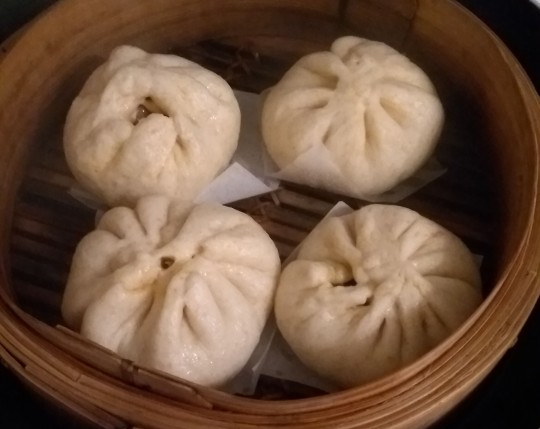
63 notes
·
View notes
Text
House in the Cerulean Sea is Absolute Bliss

I finished this gem of a book earlier this week. One of my friends read it, and The House in the Cerulean Sea has spread like wildfire through my social circles ever since. One reviewer described this novel as “Simply perfect... like being wrapped in a big gay blanket.” I couldn’t agree more! Anyone looking for a therapeutic comfort-read during LGBTQ+ Pride Month: TJ Klune has got you covered.
To be honest, I can’t tell if The House in the Cerulean Sea is written for children or adults. The premise is kid-friendly; a caseworker in the Department in Charge of Magical Youth (DICOMY) goes on a highly-classified investigation of one particularly supernatural orphanage, run by the charming Arthur Parnassus. That said, TJ Klune explores very adult themes in this framework, including prejudice, life dissatisfaction, systemic discrimination, and child abuse. Listed like that, this light-hearted fantasy sounds more like a dystopia, but the author tackles those topics with utmost respect and intention. It’s refreshing to see a fantasy novel fully realize the gravity of its darker plot elements.
Another refresher: diverse characters! After years of reading books and watching movies about rail-thin mid to late teens falling in love and saving the world, forty year-old (overweight) protagonist Linus Baker and his love interest, the forty-five year-old Arthur Parnassus, are a DELIGHT. They have real quirks, character flaws, personalities, and their story is all the better for it. And the KIDS! Goodness, the kids. They’re wonderful. I won’t list them all here, much better to meet them yourself, but my personal favorite was Chauncey, the translucent jelly / sea creature who dreams of becoming a bellhop. I was completely charmed.
I could ramble on and on about this book. Closing The House in the Cerulean Sea for the final time, I didn’t just feel whimsically happy, I felt inspired. Seeing a found-family accept themselves, embrace each other, and spark change in an unjust world... it drives readers to do the same. For all who’ve already journeyed to the Marsyas Orphanage, I hope you loved it as much as I did. Those who’ve yet to depart, enjoy your stay.
#house in the cerulean sea#gay#lgbtq#fantasy#romance#magic#fiction#happy pride 🌈#pride#pride month#lesbian#occult#paranormal#young adult#contemporary fantasy
59 notes
·
View notes